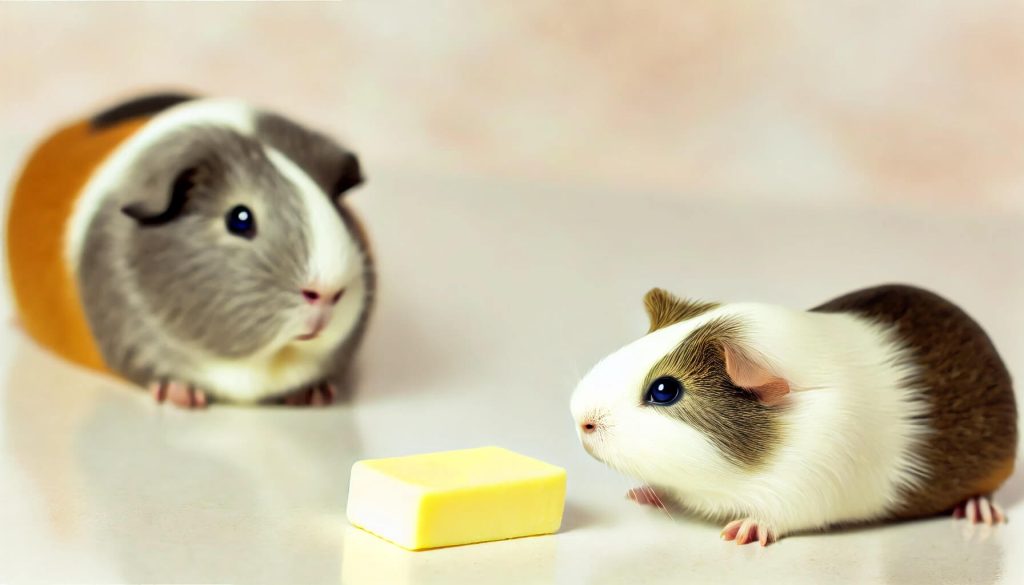
Can Guinea Pigs Eat Butter?
Overview of Guinea Pig Diet
Guinea pigs require a balanced diet to stay healthy. Their diet mainly consists of hay, fresh vegetables, and specific pellets.
Essential Nutrients for Guinea Pigs
Guinea pigs need several essential nutrients. Vitamin C is crucial as they can’t produce it themselves. Pellets fortified with vitamin C help meet this need. Timothy hay should be available at all times; it aids digestion and wears down their constantly growing teeth. Fresh vegetables like bell peppers and leafy greens provide additional vitamins and minerals. Always introduce new foods gradually to avoid digestive issues.
Foods to Avoid for Guinea Pigs
Certain foods are harmful to guinea pigs. Avoid dairy products like butter, as guinea pigs lack the enzymes to digest lactose. Never feed chocolate, onions, garlic, or potatoes; these can cause severe illness. Even fruits high in sugar, such as grapes and bananas, should be given sparingly to prevent obesity and dental problems. Always check that the vegetables and fruits you offer are pesticide-free.
By adhering to these guidelines, you ensure that your guinea pig receives a diet rich in essential nutrients while avoiding harmful foods.
Can Guinea Pigs Eat Butter?
Guinea pigs cannot eat butter. Their digestive systems are not equipped to handle dairy products, including butter, which poses serious health risks.
Nutritional Content of Butter
Butter contains high levels of saturated fats, cholesterol, and minimal nutritional value for guinea pigs. Unlike herbivores, guinea pigs lack the enzymes to process dairy products. Butter includes:
- Saturated Fats: 7 grams per tablespoon
- Cholesterol: 30 milligrams per tablespoon
- Vitamins: Minimal amounts of vitamins A and E
These components do not align with guinea pigs’ nutritional needs, focusing on fiber, vitamins C, A, and calcium.
Potential Health Risks
Feeding butter to guinea pigs results in severe health issues:
- Obesity: High-fat content leads to rapid weight gain, increasing stress on vital organs.
- Digestive Problems: Lack of lactase enzyme causes gastric disturbances, diarrhea, and bloating.
- Cardiovascular Issues: Increased cholesterol can lead to heart disease, rare but possible in obese guinea pigs.
Avoid dairy products to ensure your guinea pig remains healthy. Always prioritize a balanced diet tailored to their digestive requirements.
Healthy Alternatives to Butter for Guinea Pigs
Guinea pigs can’t eat butter, but plenty of nutritious options exist.
Recommended Treats for Guinea Pigs
- Timothy Hay-Based Treats: Provide dental health benefits and digestive fiber.
- Bell Peppers: Offer Vitamin C and crunch; avoid seeds.
- Carrot Pieces: Give in moderation for healthy teeth and Vitamin A.
- Herbs: Parsley and cilantro are tasty and nutritious.
- Commercial Guinea Pig Treats: Check for high fiber and low sugar.
- Leafy Greens: Romaine lettuce, kale, and spinach; avoid iceberg lettuce.
- Berries: Strawberries and blueberries are rich in antioxidants.
- Bell Peppers: Red and green; provide vital nutrients.
- Carrots and Cucumber: Offer hydration and vitamins.
- Zucchini and Squash: Add variety and fiber to their diet.
Conclusion
Ensuring your guinea pig’s diet is properly balanced is crucial for their overall health and well-being. Avoid feeding them butter or any other dairy products to prevent serious health issues. Instead, focus on providing a variety of safe, nutritious foods like hay, fresh vegetables, and specific pellets. By sticking to these guidelines, you can help your guinea pig thrive and live a long, healthy life.
